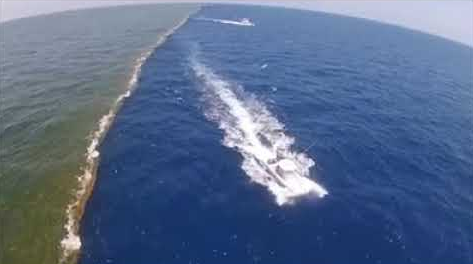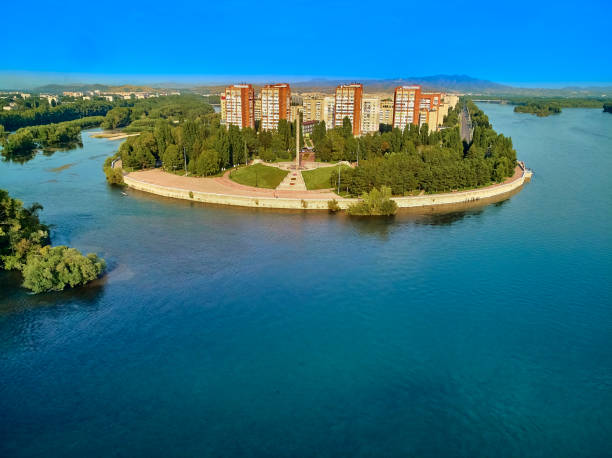Why the Atlantic and Pacific Oceans Not Mixing
Don’t you think, though, that only the Atlantic and Pacific oceans don’t get on well with each other! There are a lot of places on the planet where water in the two seas or rivers does not mix. There are also thermoclines – borders between water of different temperatures, like the warm water of Gulf Stream and much colder North Atlantic Ocean. Chemoclines are the most amazing ones.
It is a sea within the Atlantic Ocean which has no shores but you’ve got no chance not to notice it. Let’s have a look at other most spectacular clines on the planet.
1. The North and Baltic Seas
These two seas meet near the Danish city of Skagen. The water in them does not mix because of different density. Sometimes you can see the waves of the 2 seas clash into each other, making foam. And yet their water mixes gradually, that’s why the Baltic Sea is slightly saline. If there had been no water coming to it from the North Sea it would’ve been a huge freshwater lake.
2. The Mediterranean Sea and the Atlantic Ocean
They meet at the Strait of Gibraltar and have a different density and salinity, so their water does not mix too.
3. The Caribbean Sea and the Atlantic Ocean
The place where they meet is near the Antilles and looks like someone has painted water with different shades of blue.
Another place where these two meet is the Eleuthera Island of Bahamas.
The Caribbean seawater is turquoise and the Atlantic Ocean water is dark blue.
4. The Surinam River and the Atlantic Ocean
They meet near Paramaribo in South America.
5. The Uruguay River and its afflux
These two meet in Misiones province in Argentina. One of them is cleaned to be used in agriculture, and the other gets almost red because of loam during rainy seasons.
6. The Rio Negro and Solimões Rivers
Part of the Amazon River 6 miles from Manaus in Brazil, Rio Negro and Solimoes rivers low into each other but don’t mix for about 2.5 miles. The Rio Negro is dark and Solimoes – light, they have a different temperature and speed of flow.
7. Mosel and Rhein
They meet in Koblenz, Germany. Rheine has lighter water and Mosel – darker.
8. Ilz, Danube, and Inn
The junction of these 3 rivers is in Passau, Germany. Ilz is a small mountain river to the left, the Danube is in the middle, and Inn is the light river to the right. Inn is wider than the Danube here but still is its afflux.
9. Alaknanda and Bhagirathi Rivers meet in India
Alaknanda is dark and Bhagirathi is light.
10. Irtysh and Ulba
Flow into each other in Kazakhstan near the city whose name you’ll never be able to pronounce, nor will I. You give it a shot. (Ust'-Kamenogorsk.) The Irtysh has clean water and Ulba – cloudy.
11. The Jialing and Yangtze Rivers meet in Chongqing, China
The Jialing is clean and the Yangtze is brown.
12. Irtysh and Om
These two rivers flow into each other in Omsk, Russia. The Irtysh is cloudy and the Om – pure and transparent.
13. Chuya and Katun rivers meet in the Altai Republic, Russia
The water of the Chuya has an unusual cloudy white color here and looks dense and thick. Katun is clean and turquoise. Flowing into each other they form a single two-colored flow that does not mix for some time.
14. The Green and Colorado rivers
15. The Rhone and Arve Rivers
They flow into each other in Geneva, Switzerland.
The Rhone is a pure river that flows out of the lake of Geneva, the Arve is cloudy as it gets its water from glaciers of the Chamonix valley. So, water you think about all this water? Of course it’s a bad joke, like a lot of my bad pronunciations of those river names.
Hey, if you learned something new today, Comment and share it with a friends.




















.png)
